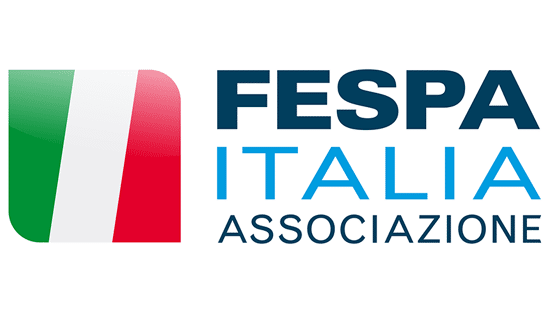Confronting the COVID-19 crisis
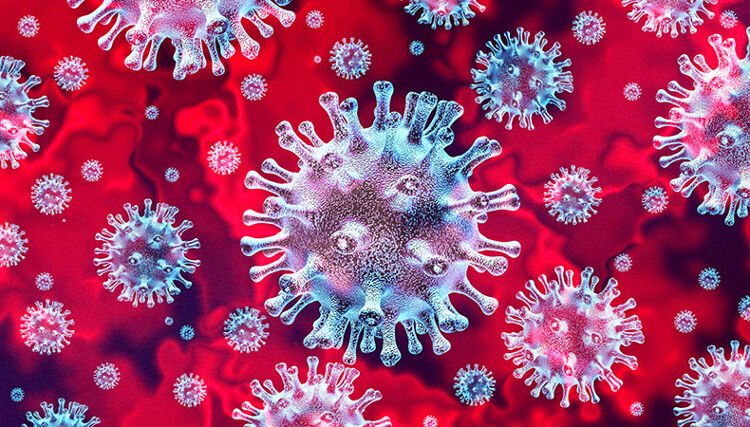
How are printers handling the onslaught of COVID-19, what will the consequences be for the industry, and are there any lockdown silver linings?
Europe is now the epicentre of the coronavirus outbreak. In the UK, Mark Young, Head of the UK’s largest trade printer, Route 1 Print, says: “We’ve seen a big drop in our usual sales levels and that’s had a huge impact on the team. But we planned well and have the team set up working remotely where possible and we’ve got people doing jobs they wouldn’t usually do so we’re seeing it as an opportunity to cross-skill the team. We have some staff on furlough and have provided them with access to some training materials they can use in their spare time. It’s been a huge challenge, but I’m really proud of how we’ve managed so far.”
Redundancies and cancellations
At Visix in Belgium, a leading textile printer for events, stands and panels, CEO Jean van Houtryve has just emerged from 16 days of self-isolation with his family at the beginning of April. The business too had suffered a blow.
Despite a good start to the year, by the end of April we will only have achieved 20% of our normal turnover
“We have been growing for the past 10 years, recruiting new people – and for the first time ever we have had to make people redundant,” he says. “Today, we only have about one person left per division in the company: in all, only 15 out of 80 people are still employed. At the beginning of March, a lot of events were cancelled, and we lost more than €250,000. Orders for beach flags and banners for summer events have also been cancelled. Despite a good start to the year, by the end of April we will only have achieved 20% of our normal turnover.”
By the end of the month, however, Jean was more upbeat, having just received an order for: “We initially received an order for 50,000 printed face masks. We developed a prototype, launched a price list and started selling these items to end users. Four days later, the firm has accepted orders for more than 250,000 masks and quoted for over one million pieces.
“I have ordered six extra stitching machines, a fully automated robot for finishing and are producing on three sites with all the people we had plus extra interims. Business is booming again.”
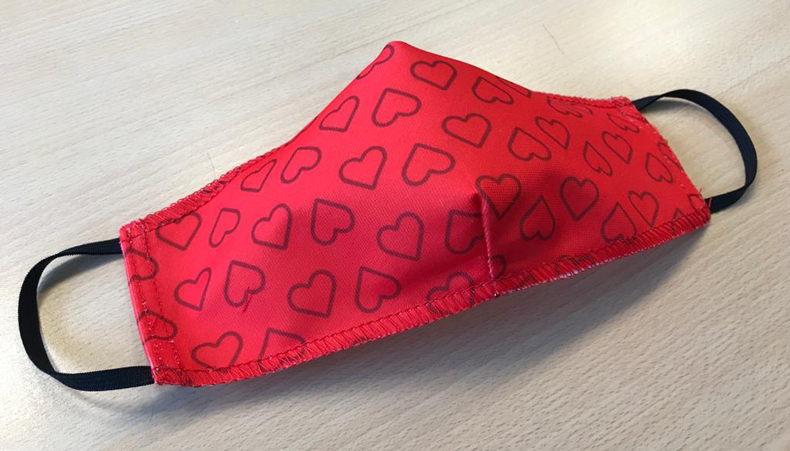 Face mask manufactured by Visix
Face mask manufactured by Visix
In Switzerland, at Atelier fuer Siebdruck (AfS), Lorenz Boegli says the firm is carrying on with the smallest possible number of staff. “Business is around 80% less than usual,” he says. “We are living on reserves but expect it to improve again from August onwards. We use the free time to develop innovations, which we can then present in autumn.”
At Printful, a print-on-demand giant that employs more than 800 workers across five fulfilment centres in Europe and North America, Head of Marketing Raitis Purins, in Latvia, says: “Currently, we are continuing to fulfil as many orders as we can. Our branches in North Carolina and LA are operating at basic capacity, and our European and Mexican branches are operating as normal. All branches are practicing extra safety measures. On top of that, we have launched partnerships with back-up facilities in the US, Australia and Europe to help us manage order volume, and we’re routing orders to wherever they can be fulfilled most efficiently.

Raitis Purins, Printful
“We started to cut non-essential costs and prepare for weathering the storm early on. We did notice a decrease in demand here and there but by this point, there’s again an increase in the number of new stores opened and also demand for our services. Our mission during these times is to continue supporting online merchants, especially during these times to enable people to work from home.”
By all accounts, before the crisis struck, figures were looking good across the sector early in 2020. In Israel, Ronen Samuel, Kornit Digital’s Chief Executive Officer, says: “The first quarter was off to an excellent start before the global effects of COVID-19 began to severely impact the fashion, apparel and home décor sectors. We were expecting significant new business and expansion projects with strategic accounts and had strong momentum globally with customers of all sizes across our portfolio.
The market has significantly slowed down, but it’s not hopeless
“Measures implemented to fight the pandemic such as fashion and apparel retail shutdowns, community lockdowns and curfews, school suspension at all grades, suspension of professional and recreational sports at all levels, and postponement of all corporate and entertainment promotional events, had an immediate impact on our customers, some of whom have had to cease operations entirely. As a result, we are seeing customers postpone their purchasing. Kornit did not shut down and employees either continue to work from home or come to the office and labs according to the local instructions.”
In Vietnam, where Dmitry Sarbaev is Managing Director of direct-to-garment (DTG) giant Fluxmall, all non-essential businesses have been closed, and cases of COVID-19 are relatively low. “All our sales, marketing and finance staff work from home, having daily check-in meetings, attending webinars, and communicating to customers non-stop. The market has significantly slowed down, but it’s not hopeless. Our production people work, as allowed – no more than two people at once – to make samples, print orders, and so on.”

Daniel Sunderland of Canagraf
In Mexico, where government income guarantees are absent and social safety nets are more threadbare, the effects of the crisis are harsher. Daniel Sunderland of Canagraf says: “We are receiving no help from the government. As business owners we are responsible for the wellbeing of all our employees. This means that we need to pay as much as possible to our employees but keeping enough working capital not to be bankrupt from this crisis.
“We need to keep in mind that this is going to take a long time and to get the factories working at usual capacity. It is going to take a couple of months after lockdown is over; this is because at first, people are going to use their money only to buy the basics, so orders are going to be small and slow.”
Staying positive
Some printers who haven’t shuttered themselves completely have been able to repurpose operations for the greater good. Mark at Route 1 Print set about printing official NHS posters with official coronavirus guidelines for clients to help spread awareness. The posters have been made available for free with customers only having to pay the postage.. He says: “We’ve seen some really great interest with plenty going through; we have loads of them so we’re encouraging more and more people to take advantage.”
His advice to businesses that can handle it? “Do what you can. We’ve looked at things we could be doing to support the NHS and frontline workers and we’ve really changed the way we do things to support other businesses in the industry. We can’t succeed if our customers don’t, so we’ve launched a whole new range of services and products that we’ve never offered before to make sure our customers can keep their work moving.”
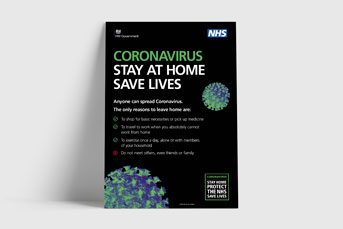
NHS posters printed for free by Route 1 Print
Paul Noble, Managing Director of Bannerbox, who sits on the board of FESPA UK, describes how, just days after closing the factory in Chesterfield, the firm designed, prototyped and produced a new protective face visor to support frontline medical staff. “We just happen to have the right kind of equipment that could be repurposed to create personal protective equipment [PPE]. On day one, production was about 100 units, and within a week it was up to around 2,000.” By the end of April, volumes had increased massively. Bannerbox had orders for more than 150,000 visors and was shipping at around 7,000 units a day. “We have also made 10,000 medical gowns and will be producing over 20,000 more at the rate of around 500 a day.
“Effectively the print side of the business has collapsed, but we’re managing to keep the equipment and some of the people going by literally repurposing the business for something completely different. We’re getting a real mix of orders: some directly from the NHS frontline, others from businesses – care homes, retail, funeral directors, mosques and GP surgeries – and some directly from individual customers who want personal protection.”
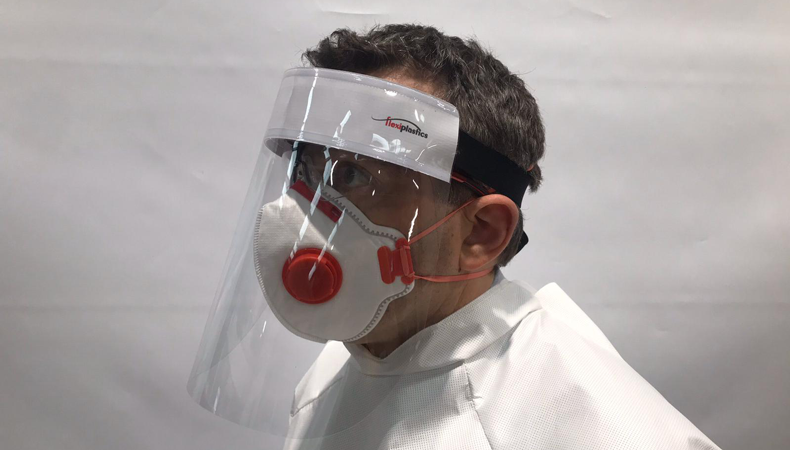
PPE made by Bannerbox
As for many printers dependent on events and retail, Bannerbox’s business exists on very short lead times. “We only have visibility of a week to 10 days on work that is coming in. When the restrictions came in, it was like switching a light off. There was no order book we could quietly be getting on with, so I had that thankless task of standing in front of employees to furlough them. Then, literally an hour later, saying: ‘Hang on a sec, guys. I think we can make PPE. Can I have some volunteers?’ It was fantastic.”
A helping hand
Before the influx of face mask orders, Jean at Visix turned the company’s hand to producing white flags with red hearts on to support health workers in Belgium who are fighting for people’s lives. He says: “After starting with some flags for our factory in Roeselare in Belgium and in Glogow in Poland we have now sold over 1,000 flags in Belgium. For each flag we sell, we donate €10 to a good cause in the health sector. It’s been a massive success. It keeps our machines working and gives the firm a lot of positive energy. There’s no point in merely sitting down waiting for the storm to end, so we’re glad we can create this positive vibe.”
Practical advice
Jean from Visix thinks a cold, hard look at financing is crucial. “Look at your accounts to see how long you can survive the battle and take action. Pick up a calculator and see what money remains with customers. At Visix, outstanding invoices had increased by 20%. We worked out how we could call them, explain to them and persuade them to pay us.
“We reduced the number of staff, postponed loans for six months and made a cash plan: how much money will be coming in day by day over April. How many people will pay us? What are our outgoings? We have a battle plan for the next six months that we think should see us through and ensure the firm’s survival.”
SMEs are in a good position to help in that time gap before the large-scale government response kicks in. Other businesses can come up with products or solutions using the equipment and skills that they have to hand
Paul Noble recommends looking at the skills and equipment you already possess and exploit it for the greater good: “Nobody asked us to start making PPE, we just pushed it out there. SMEs are in a good position to help in that time gap before the large-scale government response kicks in. Other businesses can come up with products or solutions using the equipment and skills that they have to hand.”

Dmitry Sarbaev, Fluxmall
Social distancing doesn’t mean social isolation, says Dmitry Sarbaev. “Observe how consumer behaviour is changing and follow the trends. It's vital to adapt business models to what's going on. In times of social distancing we see online models stepping up. We have a chance to use methods, tools and technologies to reach out to our customers in the most personalised ways.”
But don’t navel-gaze, he says. Act. “People want to hear from brands. Comforting words and solid action is what is needed. COVID-19 hurts, but it is temporary. We need to see opportunities amid the outbreak, not just threats.”
Raitis at Printful believes that, in these troubled times, it is more important than ever to keep an eye on the essential parts of the business, such as taking stock of your products. “Just like you might rotate your products based on seasons and spending events, look at whether all of your products suit current events. For example, with people avoiding crowds and beaches, rash guards might not be a best-selling product. We recently launched neck gaiters and face covers as the demand is high for these products. Expanding your home and living category while people are spending time at home also makes sense.”
“You can also run an audit of your marketing campaigns. Got a low-performing Facebook ad? Stop running it. While you might not want to drop all of your marketing activities, you definitely want to focus on the platforms that work.”
Now that there's so much uncertainty around, it's important to show support to others and raise spirits
Raitis adds: “People are spending a lot more time at home and on social media. To engage with your customers and followers, share what projects you’re working on and what’s on your mind in general. Now that there’s so much uncertainty around, it’s important to show support to others and raise spirits.”
In Mexico, where government aid is minimal, FESPA Board member, Daniel Sunderland recognises that businesses have to rely on their wits – and sheer bloody-mindedness. “Stay alive, stay alive. You can do it,” he implores. “We have a responsibility to the families of our employees and to society. Contact your local association, let them help you to negotiate with suppliers. Remember that right now it is better to receive a reduction in salary than to be fired, so reach an agreement with your employees. Use what local government programmes you can. If you are frustrated, reach out to industry friends and talk – I am always available through email.”
Keep your distance
But if production is still running, how have business leaders been able to keep products rolling out and money rolling in without contravening government advice on social distancing? Paul at Bannerbox says: “We’ve implemented the advice to the best of our ability. We can’t operate at full capacity because we’d have people working too closely together. Our workbenches would ordinarily have people working about a metre apart. We’ve opened up every other workstation to create more space and put tape on the floor to ensure employees are working the requisite two metres apart. People are allotted a particular corridor to travel along and a particular bay to work in. It causes problems, because they have to remember not to help out co-workers, or pass items along. But we have got lots of PPE on the premises!”
A lot of businesses that are running on a day-to-day, hand-to-mouth basis will find it very hard to recover
In Italy, printer P&P Productions has been permitted to stay open, Foreign Trade Assistant Francesca Lorusso says. “It is compulsory for staff to wear masks and gloves and to respect a two-metre distance. Transporters must fill a special module where they keep track of their movements and declare they do not show any symptoms or have been in contact with COVID-19 infected people. After showing this, and donning PPE, they can enter the site and open the cargo.”
A long, hard recovery?
Paul at Bannerbox says: “We’re still haemorrhaging: I’ve got 15 people making PPE, but 50 people sitting at home furloughed. Economically, it’s going to be an incredibly long and painful recovery.
“We’re wide format, so we’re primarily printing for events and promotions, and those industries, the customers that we would normally service, have literally shut down. Those events are lost forever – you can’t rerun Glastonbury 2020. A lot of businesses that are running on a day-to-day, hand-to-mouth basis will find it very hard to recover.
“FESPA UK represents a very broad church of printers. If you’re in industrial printing, printing circuits for example, those manufacturing processes are to a degree holding up, and can be restarted. But those in wide format, printing for retail and events, have been decimated – there are going to be some very tough times ahead.”
If we don't improve our online offering, we won't survive
Jean from Visix accepts that the road to recovery will be long and hard, but the firm has already been brainstorming ideas to weather the storm. Key to that is investment in and improvement in the firm’s online shop, that had been somewhat overlooked previously. “If we don’t improve our online offering, we won’t survive,” he says.

Jean van Houtryve, Visix
“We also decided to develop three new product lines: ‘Protect’, safety products that businesses can use to protect their staff; ‘Guide’, products such as ‘keep your distance’ stickers for the floor, signs indicating that local businesses offer takeaway food or online services; and ‘Boost’, for when retail outlets slowly reopen, printed advertising will be needed to showcase new products and encourage shoppers to come back.”
I do think print will recover quickly though as businesses will be desperate to get marketing again
And Jean believes that businesses close to home will bounce back from the crisis first: “It’s logical that people want to support local business first.”
Dmitry Sarbaev of Fluxmall also thinks the power of the internet will help business get back on its feet. “A few weeks ago, we started the campaign ‘How can we support you in uncertain times?’ as we reach out to our customers. We've made a significant effort over the last month and a half to transform our business model and make it much more online-based. Within just a few weeks we will release our bilingual website, where customers can virtually buy all our products online, receive support, video manuals in both English and Vietnamese, and even apply artwork for sample printing.”

Mark Young, Route 1 Print
At Route 1 Print, Mark Young says: “Unless businesses get more support, they’re going to have to change a lot and some won’t make it. I do think print will recover quickly though as businesses will be desperate to get marketing again.”
Some players in the industry see disruption as an opportunity. Sharon Donovich of Kornit says: “We believe that as things stabilise, the textile industry will have an increased urgency to accelerate the shift to proximity and on-demand digital textile production, and Kornit is ideally positioned to execute on this need.”

Lorenz Boegli of Atelier fuer Siebdruck
In Switzerland, Lorenz at AfS thinks the virus will accelerate structural change. “The current crisis will anticipate at least three years of development. In the classic graphics industry, perhaps two-thirds of the companies will still exist afterwards. People are now getting very used to all the digital tools – e-news, e-learning, e-shopping, e-business – very well and will stick with them for convenience. One of the big losers of the COVID-19 epidemic will be the analogue world.”
Daniel Sunderland in Mexico is also bracing for change. “Some good and famous members of the industry will no longer be around after the crisis. Some new players will be created. The print industry is usually hidden behind the curtain – hopefully people will now recognise the value and need of a good and reliable printer in their process.”
Become a FESPA member to continue reading
To read more and access exclusive content on the Club FESPA portal, please contact your Local Association. If you are not a current member, please enquire here. If there is no FESPA Association in your country, you can join FESPA Direct. Once you become a FESPA member, you can gain access to the Club FESPA Portal.
Recent news
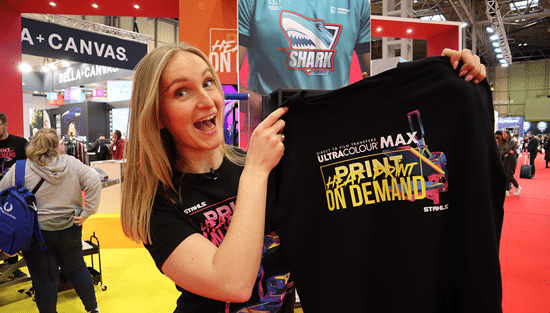
No minimum order: the growth of DTF decoration
Andy Rogers at Stahls’ UK and Europe, garment decoration firm based in Braintree, UK and Dillingen, Germany, on the cost and speed benefits of direct to film (DTF) printing.

The design democracy: AI, creativity and interior décor
We spoke to Matt Fletcher of John Mark Ltd and Cheryl O’Meara from the Print Pattern Archive about combining age-old techniques with artificial intelligence (AI) to create exciting new motifs for luxury wall coverings.
